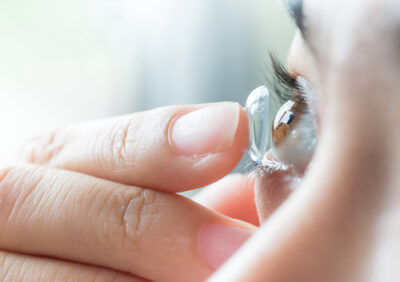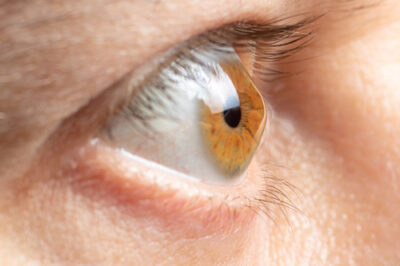A significant number of people who have a refractive error don’t only rely on glasses to see. Many people wear contact lenses occasionally or regularly as an alternative to glasses.
Contact lenses can be challenging to adjust to, but after getting used to them, many find that they’re more convenient and comfortable than glasses. However, contact lenses aren’t for everyone.
For some people, wearing contact lenses can be uncomfortable or not recommended. Keep reading to learn more about contacts lenses, including how they work and who can get them!
How Do Contact Lenses Work?
Contact lenses are lenses that work much like glasses. Like the lenses housed in glasses, contact lenses are designed to correct refractive errors, including nearsightedness, farsightedness, and astigmatism.
These lenses change the way light bends before it passes through your eye, compensating for the irregularities in the shape of the cornea or the length of the eye that cause refractive errors. Contact lenses, unlike lenses in a pair of glasses, sit directly on your eye.

There are also different kinds of contact lenses. Some are hard or rigid, and some are soft.
Soft lenses are usually best for sensitive eyes as they’re generally more comfortable and more common. However, if you have severe astigmatism or other corneal conditions, hard contact lenses may give you the best vision, as soft lenses have a more limited ability to correct your vision.
There are also contacts designed for daily wear and some designed for extended wear. Extended-wear glasses don’t need to be changed out every night and morning, but wearing them continuously will slightly increase your chance of eye infection.
There are many different kinds of contact lenses to choose from, and if you’re a suitable candidate for contacts, your eye doctor will help you find the best kind to suit your needs. However, you should be aware that not everyone is a good candidate for contact lenses.
Who Shouldn’t Wear Contact Lenses
Most people with a refractive error can wear contact lenses. But some factors may make it unsafe to wear contact lenses.
In general, you shouldn’t wear contact lenses if any of the following applies:
You’ve Had Repeated Eye Infections
Contact lens use increases eye infection risk, even if you only wear daily contact lenses. If you’re already prone to eye infections, contact lenses can increase your risk further.

It may not be the best to use contact lenses if you often get eye infections.
You Suffer From Severe Allergic Reactions
Contact lens use often causes more severe allergic reactions because allergens, especially pollen, can get in your eyes more easily when you’re wearing contacts. This is because you’re more likely to touch your eyes more frequently and because allergens can stick to your contact lenses and get stuck under them.
So, for this reason, your eye doctor may not recommend contact lenses if you have strong allergies.
You Have Problems Keeping Your Eyes Lubricated
Contact lenses naturally dry out your eyes, so you may need a lot of extra moisture when wearing them. This is also why it’s important to keep your contact lens stored properly in contact lens solution whenever you put your contact lenses in.
If you already have dry eyes, storing your contact lens in solution may not be enough to keep your eyes lubricated. If your eyes aren’t getting enough moisture, there can be serious visual complications, so you shouldn’t wear contact lenses if your eyes are already dry.
Your eye doctor will advise you on whether or not contact lenses may be a good option for you based on the health of your cornea.

You’re Exposed to Large Amounts of Dust, Dirt, or Smoke
Dust, dirt, smoke, and contact lenses don’t mix. These particles can get stuck in or under your contacts.
This can dry your eyes out and even cause corneal abrasions that can lead to infection. If you work in an environment that exposes you to many particles, like construction sites, wearing contact lenses can be dangerous, sometimes even with protective eyewear.
You Have a Specific Vision Problem That Would Make Wearing Contacts Difficult

You may have an eye condition that makes it impossible to wear contact lenses. It’s also possible that you may just need specialty contact lenses.
For instance, if you have an irregularly shaped cornea due to a condition like keratoconus, you may need a lens called a scleral lens. However, if your cornea is too thin or irregular due to keratoconus, even a scleral lens may not fit.
Your eye doctor will be able to tell you if any of your pre-existing vision problems will make wearing contact lenses difficult.
What if I Can’t Wear Contact Lenses?
If you’re someone who can’t wear contact lenses or simply doesn’t like wearing contact lenses, there’s another alternative besides glasses: vision correction surgery. LASIK and other vision correction procedures can give you total freedom from glasses and contacts.
Do you want to learn more about vision correction options, including contact lenses? Schedule an appointment today at Sugiki Portis Eye Center in Honolulu, HI, today for a consultation!





